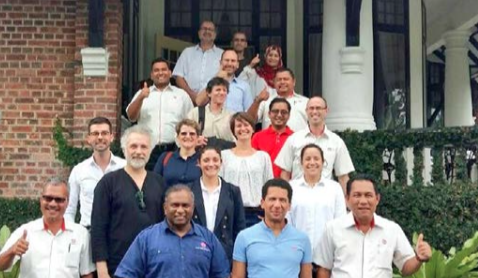The production of agricultural goods, such as meat, soya (for animal feed), palm oil, corn, etc. is the primary driver of tropical deforestation. However, a considerable share of this agricultural commodity production is intended for export. Thus, developed countries such as France, and more generally European countries, “import deforestation.”
In order to better inform policy debate around the issue, IDDRI has been actively involved on this topic since 2016, when it launched an initiative to study the economic and social relationships within global value chains and their impact on local biodiversity. This research work was carried out by involving key players in the sector. For instance, on the issue of palm oil sustainability, we worked closely with the French Alliance for Sustainable Palm Oil.
Thus, when Nicolas Hulot, French Minister for the Ecological and Inclusive Transition, announced in July 2017 that the 15th com- mitment of France’s Climate Plan would be to “put an end to the import of products that contribute to deforestation,” IDDRI was ready to provide constructive ways to address the problem.

to study issues related to palm oil, January 2018.
Together with professionals in the food industry, IDDRI showed that private approaches that guarantee sustainable production practices should be signifi- cantly strengthened and founded on proven methodology for the designation of protected areas. This analysis helped sup- port and inform the arguments of French stakeholders involved in the major over- haul of the standards for the Roundtable on Sustainable Palm Oil (RSPO)–a global standard in palm oil sustainability certifica- tion–whose revised provisions are expected to be announced in summer 2018.

23/03/2017 I Paris (France)
ZERO DEFORESTATION POLICIES AND COMMITMENTS
Intervention by Pierre-Marie Aubert (IDDRI) at the meeting of the National Group on Tropical Forests. Session in the presence of Barbara Pompili, Secretary of State for Biodiversity of France, and chaired by the Ambassador Delegate for the Environment, Xavier Sticker.
29/05/2017 I Brussels (Belgium)
THE 2017 EUROPEAN INDUSTRY MEETING ON PALM OIL
Pierre-Marie Aubert gave a presentation on the IDDRI review evaluating the different certification schemes of sustainable palm oil.
16/11/2017 I Paris (France)
REDUCING IMPORTED DEFORESTATION
Conference with Daniel
Calleja y Crespo, Director General for Environment
at the European Commission, and Laurence Moyonner-Smith, General Commissioner and inter-ministerial delegate for Sustainable Development.
In addition, drawing on the work of other researchers, especially from French agri- cultural research and international cooperation organisation (CIRAD), IDDRI also stressed the importance of distinguishing between different types of producers in the measures taken. It is important to promote production practices that help farmers from developing countries improve their income while simultaneously enhancing the sustainability of the tropical forests they are based in. This appears feasible in some cases, and as such, should form the priority focus of cooperation between European nations and producing countries.
In this context, IDDRI contributed to the proposals for action of the future French strategy to combat imported deforestation by working with government actors to draft parts of the internal guiding documents which currently inform national policy dia- logue on the issue. IDDRI also participated as an observer in a diplomatic mission by France to palm oil-producing nations in South-East Asia.
IDDRI also organised a dialogue between the Director General for Environment at the European Commission, the General Commissioner for Sustainable Development of the French government, and a diverse group of actors, in November 2017.
